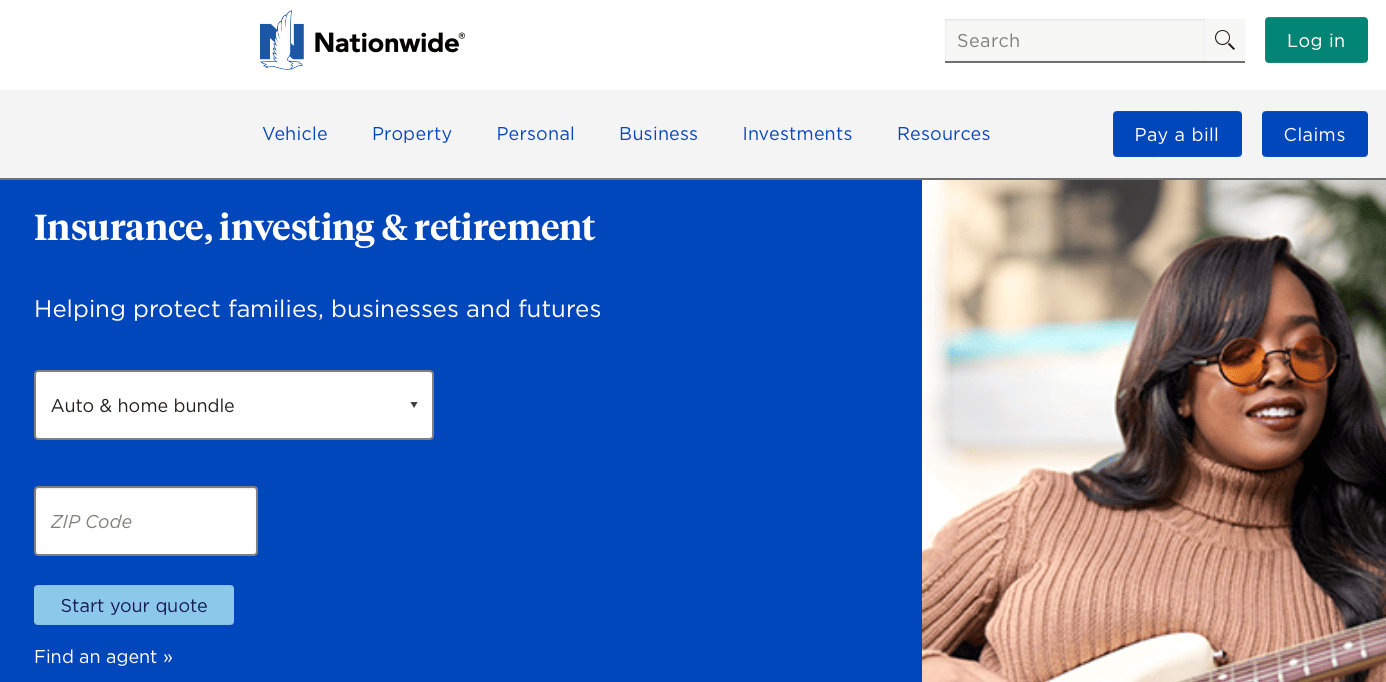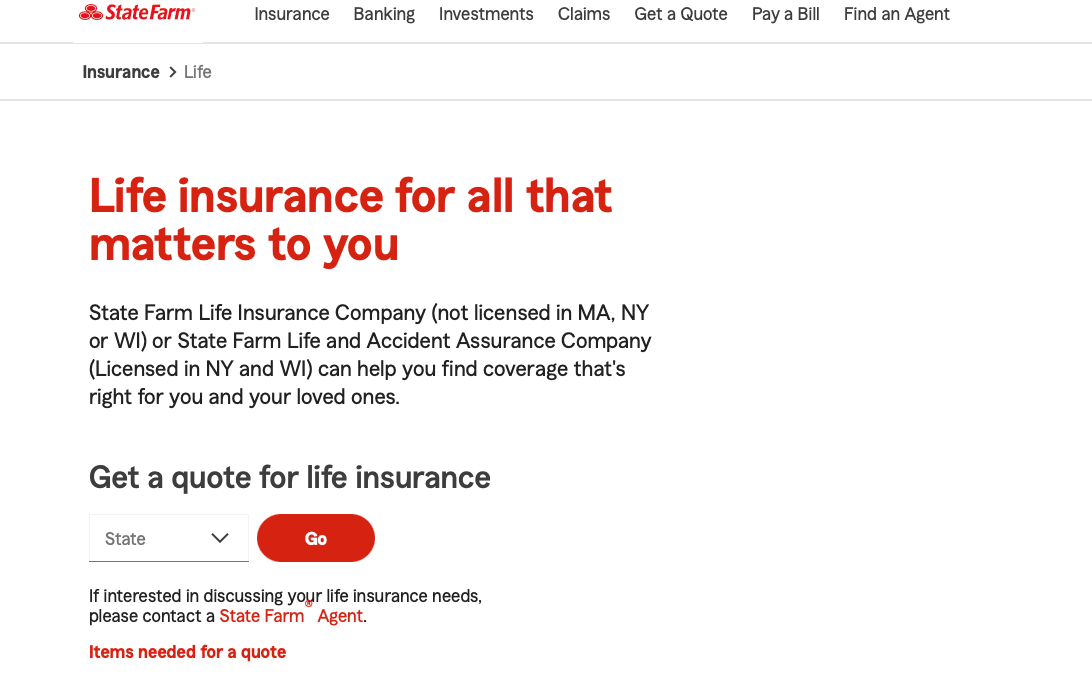Selecting the best life insurance company involves considering several crucial factors, such as financial stability, policy offerings, customer service quality, and affordability.
Nationwide emerges as our top choice for the best overall life insurance provider, but the ideal option for you depends on your specific requirements.
For instance, Protective excels in offering term coverage, while State Farm stands out for exceptional customer satisfaction.
To arrive at our life insurance ratings, we meticulously evaluated numerous life insurance companies across various essential categories.
We assigned specific weight percentages to each category based on its significance: policy types and features (21%), financial stability (17%), application process (16%), customer satisfaction (15%), customer service (14%), riders and living benefits (9%), and life insurance rates (8%).
This comprehensive analysis enables us to identify the life insurance providers that align with your unique needs.
Throughout the company information provided below, we reference NAIC complaint index scores. The NAIC complaint index serves as a valuable tool offered by the National Association of Insurance Commissioners (NAIC).
It allows you to gauge whether a company has garnered more or fewer complaints than its counterparts, factoring in market share adjustments.
| Company | Best For | AM Best Rating | Term Life Sample Cost | Policy Types | Accepts Credit Cards |
|---|---|---|---|---|---|
| Nationwide | Best Overall | A+ | $26.25/month | Final Expense, Indexed Universal (IUL), Term, Universal (UL), Variable Universal (VUL), Whole | Yes |
| Protective | Best Term Life Insurance | A+ | $22.92/month | Indexed Universal (IUL), Term, Universal (UL), Variable Universal (VUL), Whole | Yes |
| State Farm Life Insurance | Best for Customer Satisfaction | A++ | $35.24/month | Final Expense, Term, Universal (UL), Whole | Yes |
What you'll learn:
1️⃣ Nationwide (Best Overall)
AM Best Rating: A+ (Superior)
Accepts Credit Cards: Yes

Why Nationwide?
Nationwide earns the top spot as the best overall life insurance company for a multitude of reasons. They offer three valuable living benefits with most policies, have lenient no-exam requirements, maintain a robust financial standing, and have a satisfied customer base.
Pros & Cons of Nationwide
Pros
- No-exam life insurance available for exceptionally healthy applicants.
- Low NAIC complaint index.
- Living benefits are included with most policies.
- Accepts credit card payments.
Cons
- No live chat support.
About Nationwide
Nationwide is a financially secure life insurance provider with a rich history spanning nearly a century. Their product offerings include a wide array of policies that often don’t require a medical examination and boast swift approval processes.
Nationwide excels as the top choice for several categories, such as best whole life insurance company, best no-medical-exam life insurance company, and best life insurance company for individuals over 50.
The company holds an impressive A+ (Superior) financial stability rating from AM Best and maintains fewer complaints than anticipated with the NAIC, given its size. Nationwide’s diverse selection encompasses various policy types and riders, with options like no-exam life insurance for healthy applicants.
What sets them apart is that most policies come with three accelerated death benefit riders at no additional cost, covering chronic, critical, and terminal illnesses. This unique offering distinguishes Nationwide in our list of top life insurance companies.
Plans & Pricing of Nationwide
Nationwide provides a range of life insurance policies, including term, whole life insurance, universal life insurance (UL), variable universal life insurance (VUL), and indexed universal life insurance (IUL).
- Guaranteed Level Term
- Whole Life 100 and 20Pay Whole Life
- No-Lapse Guarantee UL II (universal life insurance)
- VUL Accumulator (variable life insurance)
- VUL Protector
- Advisory VUL
- IUL Accumulator II 2020 (indexed universal life insurance)
- IUL Protector II 2020
- Survivorship IUL 2020
Nationwide’s indexed policies allow policyholders to partake in stock market gains while avoiding direct market exposure. Cash value growth is tied to the performance of major indices like the S&P 500, NASDAQ-100, and Dow Jones Industrial Average.
Although these policies are less risky than variable life insurance, they can still lose value when market gains don’t offset policy expenses.
Term Pricing: A healthy 40-year-old female would pay $26.25 per month for a $250,000 30-year term policy.
Available Riders
- Chronic illness accelerated death benefit rider
- Critical illness accelerated death benefit rider
- Terminal illness accelerated death benefit rider
- Long-term care accelerated death benefit rider
- Accidental death benefit rider
- Children’s term insurance rider
- Guaranteed insurability benefit rider
- Waiver of premium rider
Nationwide’s extensive range of riders allows policyholders to customize their coverage to suit their specific needs. These options provide added flexibility and protection in various life situations.
2️⃣ Protective (Best Term Life Insurance)
AM Best Rating: A+ (Superior)
Accepts Credit Cards: Yes

Why Protective?
When it comes to term life insurance, Protective stands as a beacon of affordability and flexibility. Its policies offer remarkable pricing, and you can choose terms that extend up to 40 years—an option not commonly found elsewhere.
Pros & Cons of Protective
Pros
- Boasts the lowest pricing, sharing the top spot with Banner and Haven among 91 companies.
- Offers impressively long-term coverage, with terms extending up to 40 years.
- Provides the convenience of credit card payments.
- Extends the option of securing coverage without the need for a medical exam.
Cons
- Ranked 15th out of 22 companies for customer satisfaction in J.D. Power’s life insurance study.
About Protective
Protective earns its reputation as the most cost-effective provider of term life coverage in our comprehensive review—sharing this distinction with Banner and Haven Life.
Thanks to its competitive pricing and diverse policy options, Protective is our top pick for the best term life insurance company, the most budget-friendly life insurance company, and the preferred choice for young adults seeking life insurance.
Furthermore, Protective distinguishes itself by offering generous child riders on its policies, making it an excellent choice for individuals seeking life insurance coverage for their children.
However, it is worth noting that Protective did not fare well in J.D. Power’s 2022 U.S. Individual Life Insurance Study, ranking 15th out of 22 companies.
This may suggest potential concerns related to Protective’s customer service. J.D. Power rankings consider factors such as communication, interaction, price, product offerings, and statements.
Plans & Pricing of Protective
Protective provides a diverse range of insurance policies, including term, whole life, universal life, variable universal life, and indexed universal life insurance.
- Protective Classic Choice Term
- Non-Participating Whole Life
- Custom Choice Universal Life (UL)
- Advantage Choice UL
- Lifetime Assurance UL
- Survivor UL
- Executive UL
- Strategic Objectives II VUL (variable universal life insurance)
- Indexed Choice UL
Term Pricing: For example, a healthy 40-year-old female would pay as little as $22.88 per month for a $250,000 30-year term policy.
Available Riders
- Protected Insurability Rider (Guaranteed Insurability Rider)
- Children’s Term Rider
- Waiver of Premium
- Terminal Illness Accelerated Death Benefit Rider
- ExtendCare Rider (Terminal Illness Accelerated Death Benefit Rider)
3️⃣ State Farm Life Insurance (Best for Customer Satisfaction)
AM Best Rating: A++ (Superior)
Accepts Credit Cards: Yes

Why State Farm Life Insurance?
When it comes to putting customers first, State Farm Life Insurance emerges as the clear winner. State Farm has achieved the coveted #1 position in J.D. Power’s customer satisfaction rankings for life insurance for an impressive three consecutive years.
Pros & Cons of State Farm Life Insurance
Pros
- Demonstrates superior financial stability, providing customers with added peace of mind.
- Holds the top spot for customer service according to J.D. Power.
- Offers whole life policies that have the potential to earn dividends.
- May provide bundling discounts, allowing customers to save on premiums.
Cons
- Lags in pricing competitiveness, ranking as the fourth highest.
- Limited coverage options for no-medical-exam life insurance.
About State Farm Life Insurance
State Farm claims the throne as our preferred choice among life insurance companies for customer satisfaction, boasting a consistent #1 ranking in J.D. Power’s U.S. Individual Life Insurance studies for the years 2022, 2021, and 2020.
These comprehensive studies gauge consumer experiences with leading life insurance companies across the nation. Furthermore, State Farm proudly carries an A++ (Superior) rating for financial strength from AM Best, the highest attainable rating.
State Farm’s accolades extend beyond customer satisfaction, as it also secures its place as one of the:
- Best whole life insurance companies
- Top burial life insurance companies
- Leading return-of-premium (ROP) term life insurance companies
If you seek a whole life policy that offers dividend payouts, State Farm has you covered. Additionally, bundling your life insurance with other State Farm coverage, such as auto insurance, may unlock potential savings.
However, it’s worth noting that State Farm’s term life policies tend to be priced on the higher side compared to the 32 life insurance companies we reviewed that offer online term quotes. For those in search of no-medical-exam life insurance, State Farm’s coverage options in this category are currently limited, with the maximum coverage available without a medical exam set at $50,000.
Plans & Pricing of State Farm Life Insurance
- Select Term Life
- Return of Premium Life
- Instant Answer Term
- Limited Pay Whole Life
- Single Premium Whole Life
- Universal Life
- Survivorship Universal Life
- Joint Universal Life
- Final Expense (referred to as $10,000 Whole Life in New York State)
Term Pricing: For instance, a healthy 40-year-old female would pay approximately $35.24 per month for a $250,000 30-year term policy, which falls among the higher rates within our assessment.
Available Riders
- Guaranteed Insurability Rider
- Child Rider
- Waiver of Premium Rider
- Flexible Care Benefit Rider (Long-term Care Rider)
- Select Term Rider
- Level Term Rider
➤ Types of Life Insurance
Life insurance comes in various types, each serving different needs. Here’s an overview of the main types of life insurance:
Term Life Insurance
- Description: Term life insurance provides coverage for a specific period, typically between 10 and 30 years.
- Best For: Individuals looking for affordable coverage with the option to convert to permanent insurance.
- Key Features: Convertible term policies allow you to lock in your initial health classification. Most term policies can be renewed annually but become more expensive with age.
Whole Life Insurance
- Description: Whole life insurance offers lifelong coverage and builds cash value over time.
- Best For: Those seeking permanent coverage with guaranteed benefits.
- Key Features: Premiums remain constant, and some policies from mutual companies pay dividends.
Universal Life Insurance
- Description: Universal life (UL) insurance is a flexible form of permanent coverage.
- Best For: Individuals who want flexibility in premium payments and death benefits.
- Key Features: Cash value growth depends on current interest rates, offering flexibility but uncertainty.
Indexed Universal Life (IUL) Insurance
- Description: IUL policies allow potential gains from stock market indexes without market exposure.
- Best For: Those interested in stock market gains without market risks.
- Key Features: Gains are tied to index performance, with features like participation rates, spreads, and caps.
Variable Universal Life (VUL) Insurance
- Description: VUL combines universal life insurance with stock market investments.
- Best For: Investors willing to take risks in exchange for potential tax advantages.
- Key Features: Cash value is invested in subaccounts similar to mutual funds, but it’s not protected from market losses.
Burial Insurance (Final Expense and Guaranteed Issue)
- Description: Burial insurance, designed for older and less healthy applicants, covers final expenses.
- Best For: Older individuals with health issues looking for minimal coverage.
- Key Features: No medical exam is required, but coverage may have graded benefits and limited coverage amounts.
Understanding these life insurance types helps you choose the one that suits your needs and financial goals. Remember to consult with a financial advisor for personalized guidance.
➤ Best Life Insurance FAQ
How Does Life Insurance Work?
Life insurance is like a promise between you and an insurance company. You pay money (called premiums) to the insurance company. In return, they promise to give money to your loved ones when you pass away. This money is tax-free, and your loved ones can use it however they need.
What’s the Best Life Insurance Policy?
The best life insurance for you depends on your money situation. There are two main kinds: term life and permanent life. Term life is cheaper but only lasts for a set time.
If you don’t pass away during that time, there’s no money for your loved ones. Permanent life lasts forever, but it’s more expensive. It also has a savings part you can use while you’re alive.
What Are the Cons of Life Insurance?
The main downside is the cost. You have to pay money every month, which can be tough on your budget. How much you pay depends on things like your age, health, and how much coverage you want. If you stop paying, you lose your coverage.
Another downside is that with term life insurance, if you live longer than the set time, there’s no payout. So, you’ve spent money but get nothing in return. Also, you must qualify to buy life insurance, and if you’re not very healthy or do risky things, it can be harder to get or more expensive.
Which Insurance Company Keeps Customers Happy?
State Farm is the top pick for happy customers. They’ve been ranked the best in a study for three years in a row.
How Can I Save on Life Insurance?
To find the best deal, get quotes from different insurance companies. They all have different prices and rules, so one might be better for you. You can work with a broker or use an online tool like Quotacy to make it easier.
You might also get discounts. Some companies give you a discount if you buy different types of insurance from them, pay your premium in one go every year, or if you’re in a special group like teachers or the military. You’ll also get better prices if you apply when you’re young and healthy.
How Much Does a $100k Life Insurance Policy Cost?
The cost of a $100,000 life insurance policy depends on things like your age, where you live, what kind of policy you want, and how long you want it.
For example, a 30-year-old non-smoking man in Delaware might pay around $8 a month for a 10-year policy, $12 for a 30-year policy, and $67 for a lifelong policy. The older you are, the more it costs.
A 40-year-old man might pay $8.50 a month for a 10-year policy. If you smoke or have health problems, it’s more expensive. You need to check with an insurance company to know exactly how much it will cost you.
Can You Take Money Out from Term Life Insurance?
No, you can’t get money back from term life insurance. It’s not like a piggy bank. But some term policies let you change to a permanent one. That way, you can build up some savings and get money later. If you stick with term insurance, you can’t get any money back.
What Happens If You Outlive Term Life Insurance?
If you live longer than your term life insurance, it ends. It’s like a timer that stops ticking. But you have some choices. Some companies let you renew it without a health check, but it’s more expensive. You might also turn it into a permanent policy without an end date. Or, you can try to get a new policy. If you don’t do any of these, you won’t have life insurance anymore.
➤ How to Find the Best Life Insurance Companies
To find the best life insurance companies, we followed a thorough process. We began by studying what consumers expect from these companies, using insights from sources like J.D. Power’s 2022 Individual Life Insurance and Annuities studies and the 2022 Insurance Barometer Study by Life Happens and LIMRA.
With this knowledge, we assessed over 55 aspects of 91 life insurance companies, including their financial strength (rated by AM Best), customer satisfaction, and customer complaints reported to state insurance commissioners through NAIC (National Association of Insurance Commissioners).
We also considered factors like their years in operation, pricing, online tools, options without medical exams, policy types, and available add-ons.
Regarding NAIC’s methodology, we averaged a company’s NAIC complaint index values over the last three years (2021, 2020, and 2019) to evaluate their performance in the life insurance sector.
Our review process favored companies with strong financial stability, minimal customer complaints, and a wide range of products and resources. We placed a high value on transparent pricing, online quoting, and no-exam policy choices. Companies that offered accessible customer service, such as live chat, received better ratings.
We ranked companies based on the following criteria and their respective weights:
- Policy types and features: 21%
- Financial stability: 17%
- Application process: 16%
- Customer satisfaction ratings: 15%
- Customer service: 14%
- Riders and living benefits: 9%
- Cost: 8%
To evaluate costs, we collected term life insurance quotes for non-smokers in excellent health at ages 25, 40, and 55, seeking 30-year $250,000 term life policies using Compulife data from Term4sale.com.
We also compared specific product details, such as maximum coverage amounts, age limits, included riders (especially various living benefits available at no extra cost), and unique application processes. This in-depth research helped us identify the best companies for different product offerings, customer groups, and usage scenarios.
In summary, the companies that excelled in financial stability, had fewer complaints, offered competitive pricing, provided generous benefits, streamlined the application process, had extensive no-medical-exam options, and offered a wide array of features scored the highest across our assessment categories.



